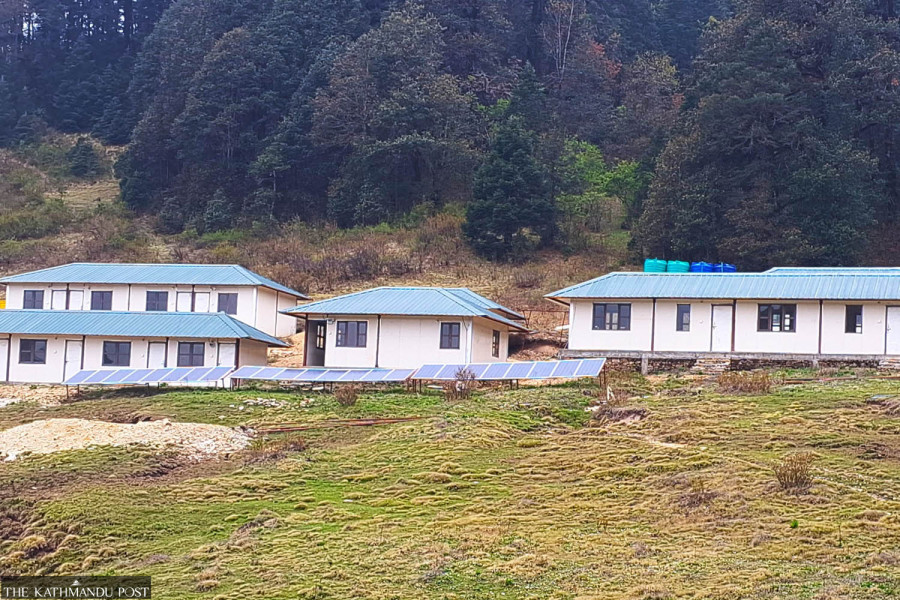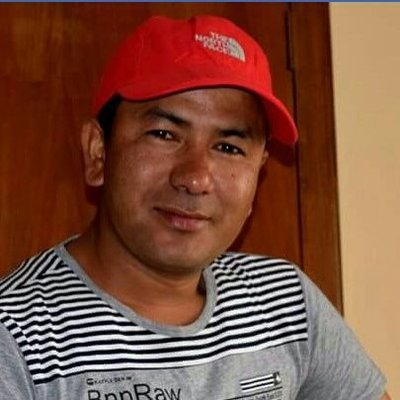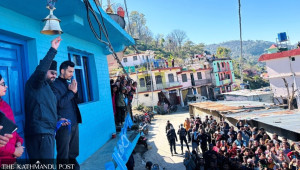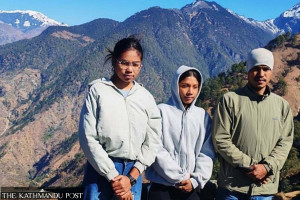Sudurpaschim Province
Khaptad’s tourist accommodation plan left in limbo
Visitors to scenic highlands, often dubbed ‘heaven on earth,’ struggle with poor lodging options.
Basant Pratap Singh
Six years after construction began, the accommodation facilities meant to house visitors at Khaptad National Park—one of Sudurpaschim Province’s most important tourist destinations—are left in limbo. Some structures still remain incomplete while others are left unused. The situation has left visitors to the scenic highlands, often dubbed the “heaven on earth,” struggling with poor and unorganised lodging options.
The project, launched in 2019, envisioned 80-bed prefabricated guest houses near the park’s main barracks in Khaptad and another 20-bed facility at Bichpani along the Doti access route. Together, the structures were supposed to accommodate 150 tourists at a time, reducing Khaptad’s longstanding accommodation bottleneck. The Nepal Tourism Board had allocated Rs50 million in the fiscal year 2018-19, awarding the contract worth Rs41.3 million (excluding VAT) to TDR & BG JV, a construction company, with the requirement that work be completed within seven months.
But after five deadline extensions, the company only managed to finish the basic structures in 2024, failing to complete water supply, fencing, wood flooring, and electrification. The park terminated the contract and reassigned the remaining works to two new contractors last year.
According to Park Ranger Parshuram Kathayat, fencing has been completed at Khaptad and wooden flooring is underway, while construction at Bichpani is nearly finished. “We are pressing the contractors to complete work quickly,” Kathayat said. “Our plan is to bring at least the Bichpani buildings into operation this year, though final decisions about management are still pending.”
Locals and tourism entrepreneurs complain that the delay has created a negative impression among visitors. “During peak tourist season, we often cram 10 to 15 people into a single room because there is nowhere else to stay,” said Deepak Bahadur Khadka, who runs a homestay in Jhigrana of Doti district. “In winter, people suffer in freezing conditions. Over the last six years, six or seven wardens have been transferred, but the buildings have never been completed. Each new warden quietly extends the contract deadlines before leaving. No one takes real responsibility.”
Tourism experts argue that such negligence undermines Khaptad’s potential. Known for its vast grasslands, spiritual significance as the abode of Khaptad Baba, and diverse biodiversity, the park has long been considered an untapped jewel of Sudurpaschim. Yet despite being declared a national park in 1984, Khaptad still suffers from inadequate infrastructure, including limited road access, poor communication networks, and lack of organised lodging.
Khem Joshi, executive director of Khaptad Tourism Development and Management Committee, said operational guest houses would change the perception of Khaptad as an inconvenient destination. “Not only would complaints about poor lodging end, but the number of visitors would also increase, and tourists would stay longer,” he said.
According to Joshi, the structures represent a significant investment. “Leaving them idle has sent the wrong message about our commitment to tourism development. Those responsible for the delays must face action, and the buildings must be brought into operation without further delay,” he said.
Officials from the Department of Urban Development and Building Construction, which is monitoring the work, admit the delays were largely due to the previous contractor’s negligence. “The previous contractor delayed and eventually abandoned the project, leaving the work incomplete,” said engineer Tilak BK. “That is why it has taken so long. But the new contractors are working at a fast pace, and we expect completion before the Dashain festival.”
Despite optimism from officials, the issue of how the guest houses will be managed once finished remains unresolved. Park authorities say discussions are underway about whether to operate the facilities through a public-private partnership, the park’s own administration, or local management committees. Until those decisions are finalised, the prospect of tourists actually using the buildings remains uncertain.
Meanwhile, local entrepreneurs continue to shoulder the burden of providing lodging under difficult circumstances. They say Khaptad’s reputation as a pristine but inaccessible destination discourages repeat visits. The lack of reliable facilities also hinders efforts to promote the park as a multi-day destination for domestic and international tourists alike.
“The government has invested millions, yet tourists still return with bad experiences. If Khaptad is to compete with other destinations like Rara or Annapurna, these facilities must open quickly and be run properly,” said Khadka.
Triveni, Baba Ashram, Kedardhunga, Khapar Daha, Nagadhunga, Sahashralinga, Ghoda Dauna Patan among others are the major tourist destinations in Khaptad National Park. But only a few tourists reach there mainly due to lack of lodging facilities.
Khaptad lies at the confluence of four districts—Bajhang, Bajura, Doti and Achham—and is home to countless Hindu shrines. It is believed to be where the Khaptad Baba achieved enlightenment after meditating for 50 years.




 11.12°C Kathmandu
11.12°C Kathmandu















